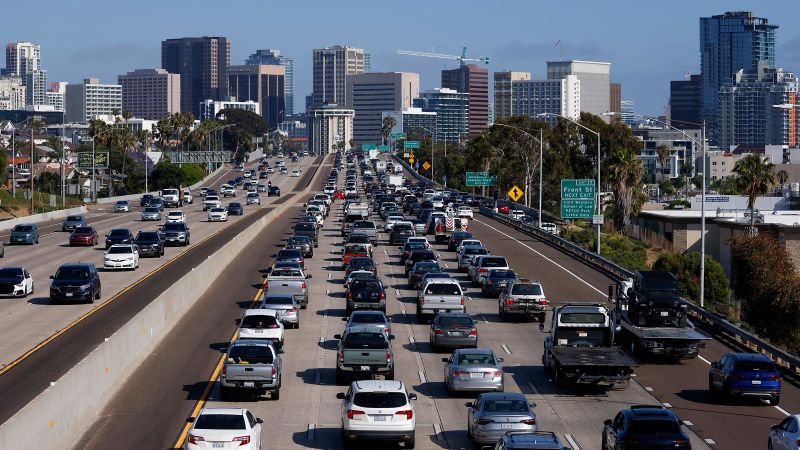CNN
—
The Supreme Court indicated Wednesday that it will revive a lawsuit from fuel producers challenging California’s strict vehicle emission rules, with both conservative and liberal justices signaling that the companies have standing to sue.
Several of the justices suggested a federal appeals court in Washington, DC, erred when it barred the fuel makers’ suit on the theory that market forces are driving the national push toward electric vehicles far more than California’s tough regulations.
“Wasn’t the goal of the California regulations to reduce the use of petitioner’s fuel?” Justice Clarence Thomas, a conservative, pointedly asked the attorney representing the EPA, suggesting that dynamic gave the companies a reason to sue over the policy.
Thomas wasn’t alone in that view. Justice Elena Kagan, a member of the court’s liberal wing, noted that when the Environmental Protection Agency reestablished the waiver during the Biden administration, officials at the time suggested they were doing so to reduce reliance on fossil fuels.
“Didn’t the EPA, in fact, in its submission to the courts, say that the effect of the reinstatement was going to be to reduce gasoline emissions?” Kagan asked.
Justice Brett Kavanaugh, another conservative, noted that the federal government didn’t challenge whether the fuel makers could sue in the DC appeals court.
“Isn’t that a tell, here?” he asked.
Given California’s size, automakers have for decades hewed to the state’s tighter emissions controls, which are permitted under an on-again-off-again EPA waiver. Democratic presidents have supported the waiver, while President Donald Trump has not.
The Supreme Court specifically declined to review the broader legality of the waiver, denying an appeal in December that raised that very question. Instead, the court agreed to decide if the fuel producers – as a function of selling less fuel because more electric vehicles are on the road – were injured by the EPA’s waiver.
While a majority of the court seemed sympathetic to the idea that the fuel producers should be permitted to sue, it was less clear after a little over an hour of arguments whether the court will embrace a firmer rule on the issue that could affect future cases.
One of the factors a party must demonstrate to establish standing is redressability, which in basic terms means that the court’s order can actually fix the plaintiffs’ problem. California argued that even if courts eliminate the waiver, that won’t help the fuel producers because consumer demand is driving the market toward electric vehicles on its own.
It’s not clear how much practical impact the court’s decision would have either way given that President Donald Trump seems almost certain to withdraw the waiver, just as he did during his first administration. The waiver was then reinstated by President Joe Biden.
Several justices pressed Edwin Kneedler, the attorney representing the EPA, on that point.
“By my count, the EPA has now changed its mind on this four times,” said Justice Samuel Alito, a conservative. “So what is the probability that there will not be a fifth?”
Kneedler noted that Trump signed an executive order asking the EPA to examine the issue.
“I mean, just out of curiosity, is there anything you can say about the timing of that process?” Kagan said.
“Not at this point,” Kneedler tactfully responded.
It’s a point that Jeffrey Wall, representing the fuel makers, was quick to jump on. If the Trump administration unwinds the policy, it is almost certain to tout that decision as wiping away a burdensome regulation on car manufacturers and fuel producers.
“I bet my bottom dollar … that in some number of months, the EPA will withdraw the waiver and will say this waiver has been having an effect from the time it was reinstated,” said Wall, who served in the Justice Department during the first Trump administration, including as acting solicitor general. “If the EPA says that in a number of months, it will be right.”
In a rare moment of levity at the end of the arguments, Chief Justice John Roberts recognized Kneedler for arguing before the high court 160 times. Kneedler is retiring from the Justice Department and his argument Wednesday was his last.
“That is the record for modern times,” Roberts said. “You have carried out your responsibilities with extraordinary care and professionalism, conscious of your role not only as an advocate but also an officer of this court.”
In a highly unusual moment in the normally staid and quiet courtroom, the justices stood in their black robes and offered Kneedler a round of applause before leaving the bench.

